人教版(2019)选择性必修第二册 Unit2 Bridging Cultures Reading and Thinking 名师教学设计
文档属性
| 名称 | 人教版(2019)选择性必修第二册 Unit2 Bridging Cultures Reading and Thinking 名师教学设计 | 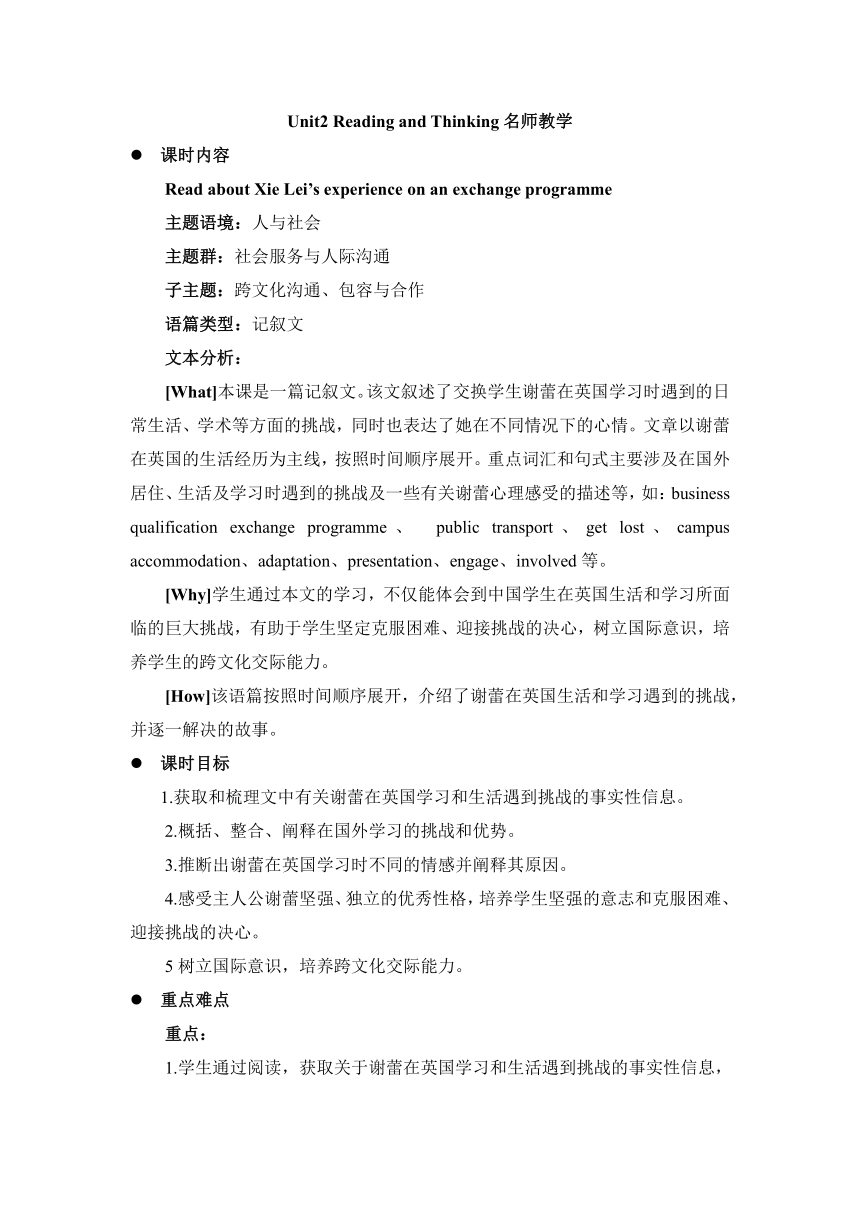 | |
| 格式 | docx | ||
| 文件大小 | 997.8KB | ||
| 资源类型 | 教案 | ||
| 版本资源 | 人教版(2019) | ||
| 科目 | 英语 | ||
| 更新时间 | 2023-03-12 13:44:39 | ||
图片预览

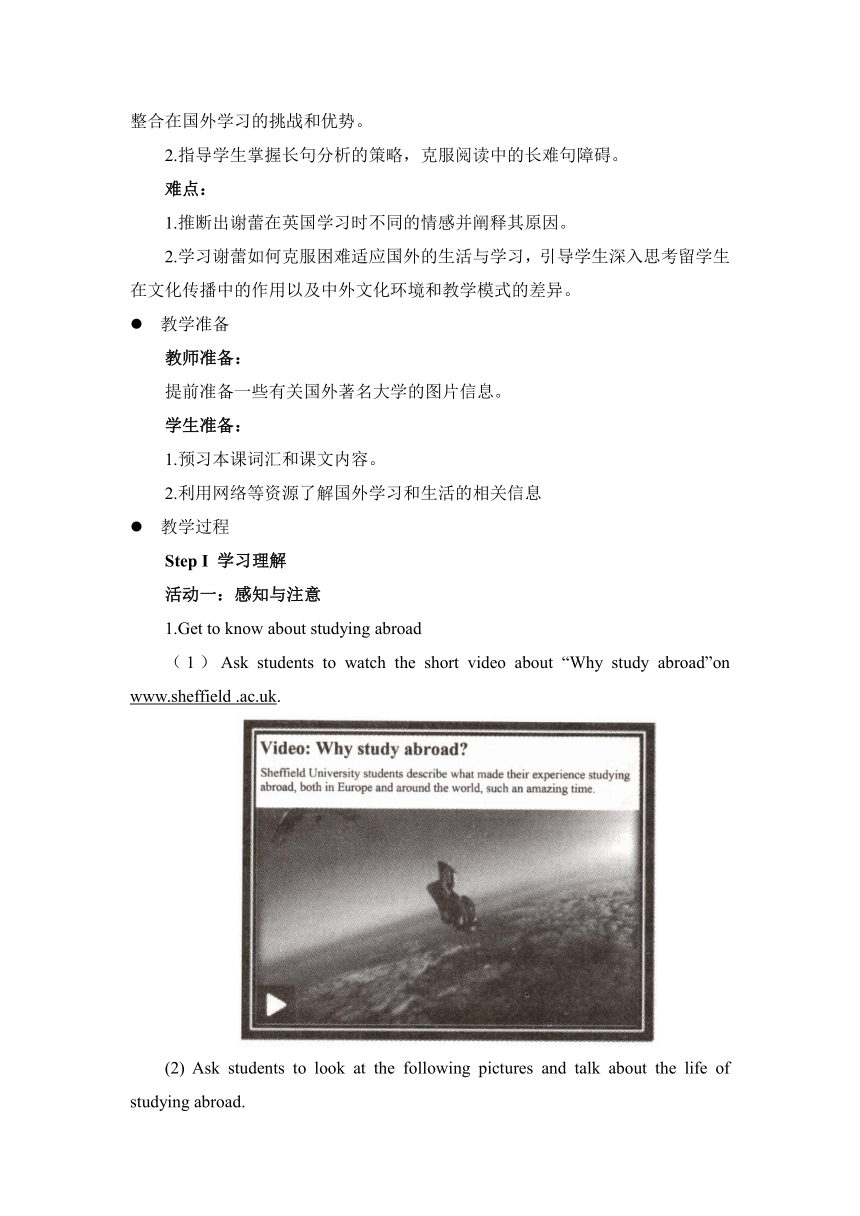
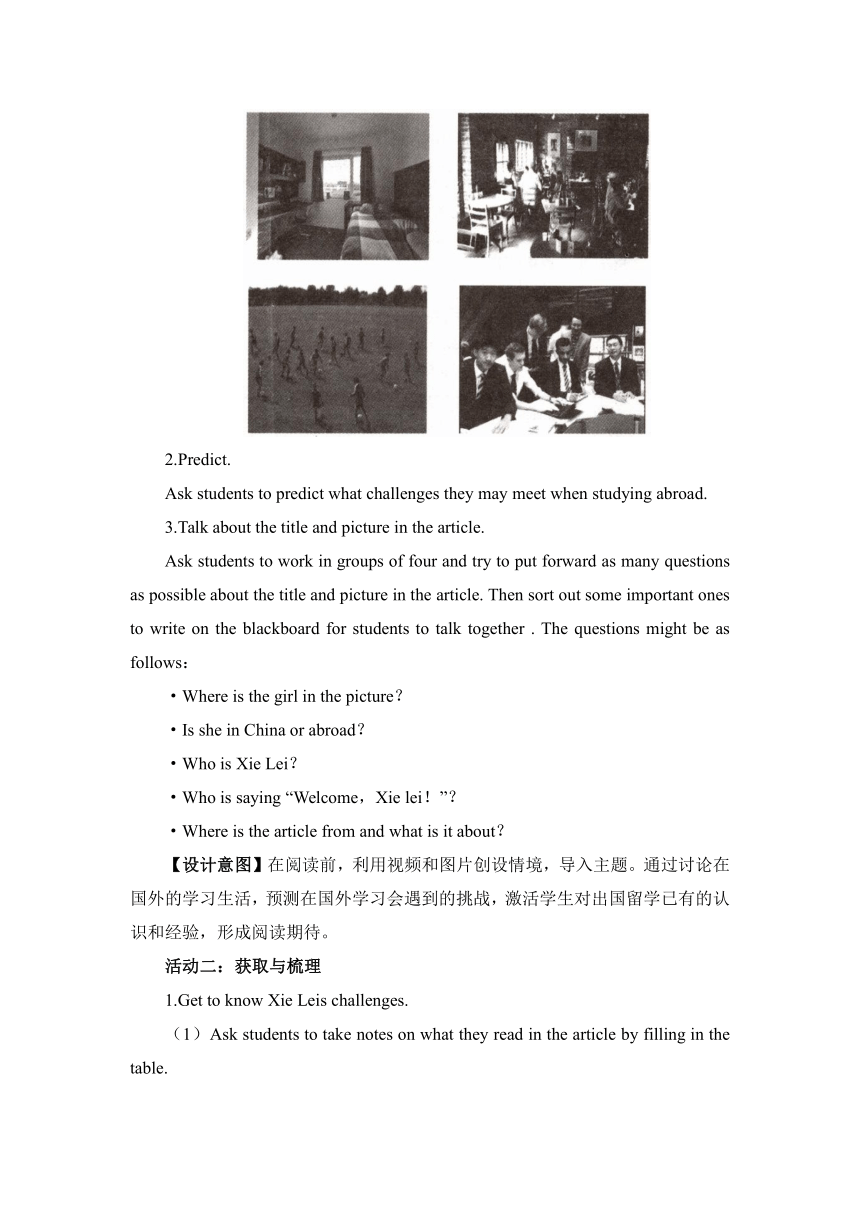
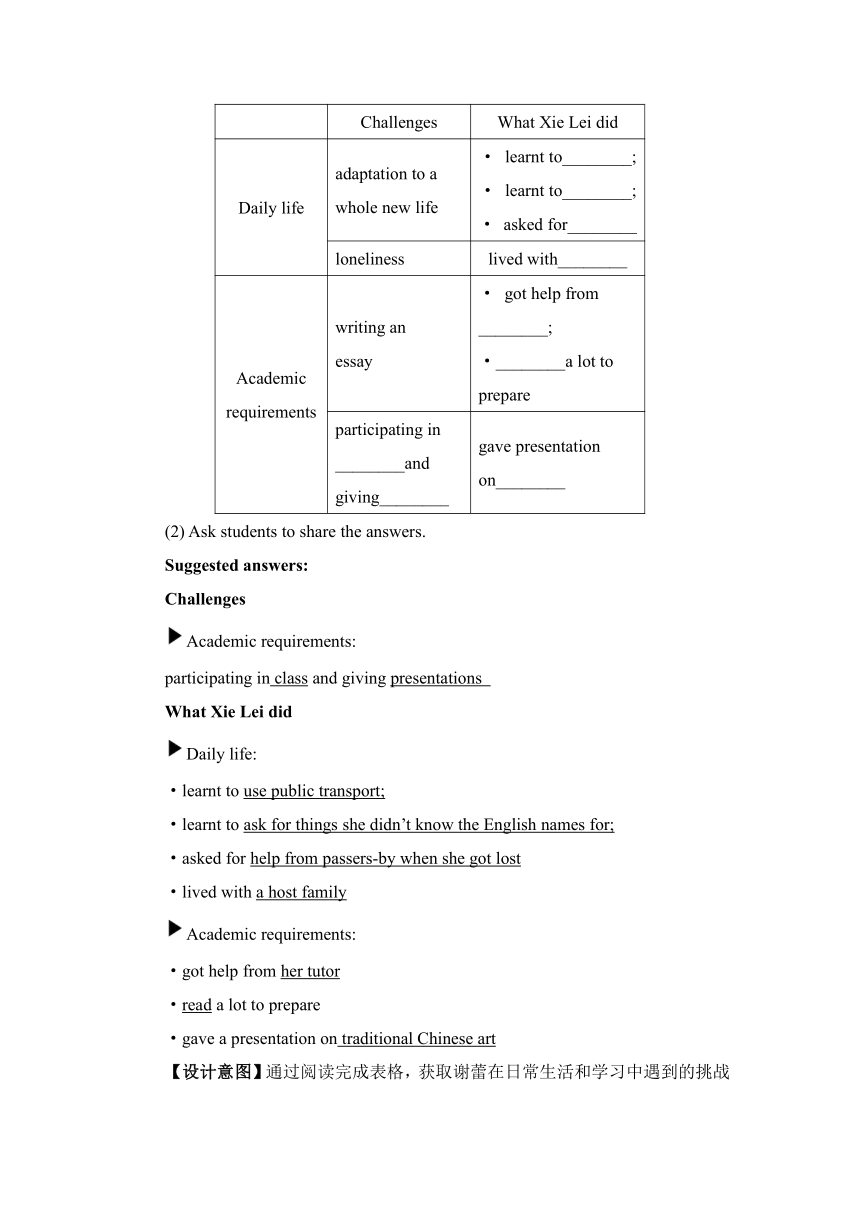
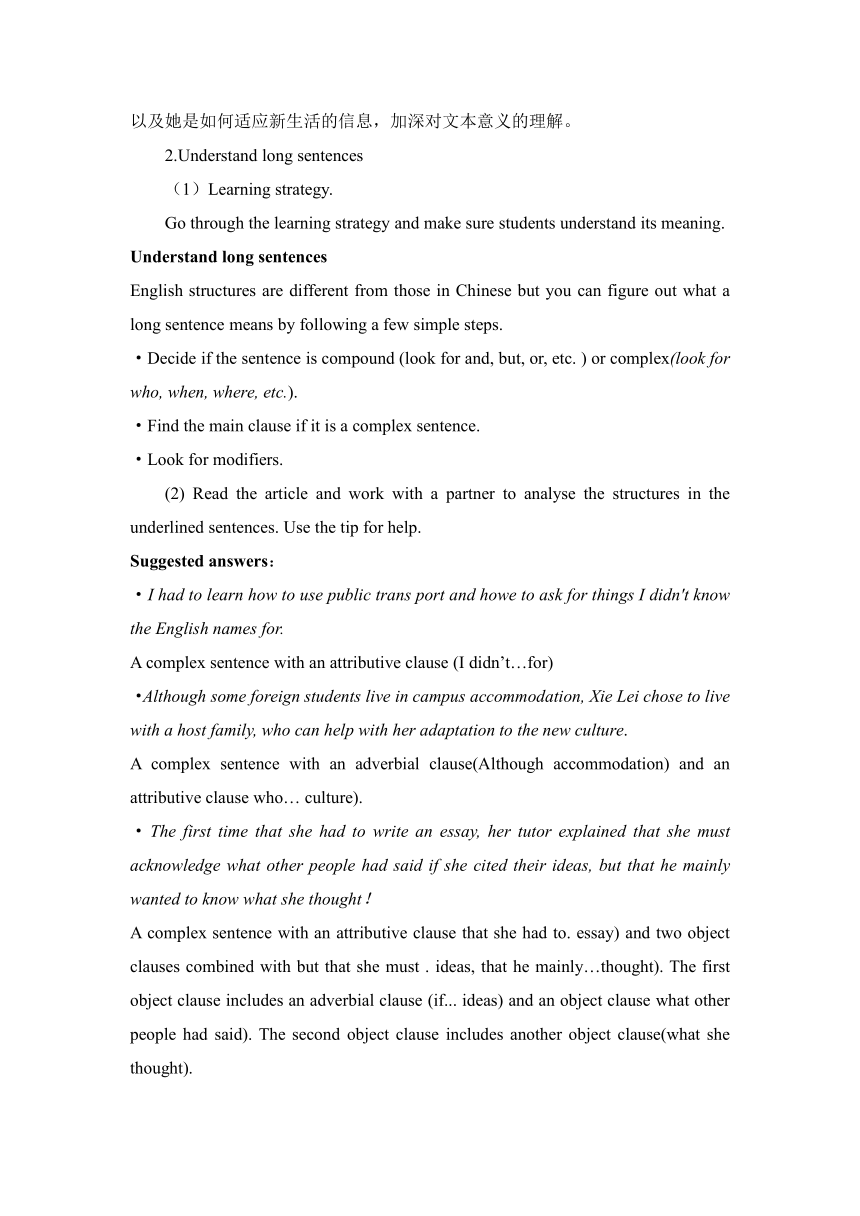
文档简介
Unit2 Reading and Thinking名师教学
课时内容
Read about Xie Lei’s experience on an exchange programme
主题语境:人与社会
主题群:社会服务与人际沟通
子主题:跨文化沟通、包容与合作
语篇类型:记叙文
文本分析:
[What]本课是一篇记叙文。该文叙述了交换学生谢蕾在英国学习时遇到的日常生活、学术等方面的挑战,同时也表达了她在不同情况下的心情。文章以谢蕾在英国的生活经历为主线,按照时间顺序展开。重点词汇和句式主要涉及在国外居住、生活及学习时遇到的挑战及一些有关谢蕾心理感受的描述等,如:business qualification exchange programme、 public transport、get lost、campus accommodation、adaptation、presentation、engage、involved等。
[Why]学生通过本文的学习,不仅能体会到中国学生在英国生活和学习所面临的巨大挑战,有助于学生坚定克服困难、迎接挑战的决心,树立国际意识,培养学生的跨文化交际能力。
[How]该语篇按照时间顺序展开,介绍了谢蕾在英国生活和学习遇到的挑战,并逐一解决的故事。
课时目标
1.获取和梳理文中有关谢蕾在英国学习和生活遇到挑战的事实性信息。
2.概括、整合、阐释在国外学习的挑战和优势。
3.推断出谢蕾在英国学习时不同的情感并阐释其原因。
4.感受主人公谢蕾坚强、独立的优秀性格,培养学生坚强的意志和克服困难、迎接挑战的决心。
5树立国际意识,培养跨文化交际能力。
重点难点
重点:
1.学生通过阅读,获取关于谢蕾在英国学习和生活遇到挑战的事实性信息,整合在国外学习的挑战和优势。
2.指导学生掌握长句分析的策略,克服阅读中的长难句障碍。
难点:
1.推断出谢蕾在英国学习时不同的情感并阐释其原因。
2.学习谢蕾如何克服困难适应国外的生活与学习,引导学生深入思考留学生在文化传播中的作用以及中外文化环境和教学模式的差异。
教学准备
教师准备:
提前准备一些有关国外著名大学的图片信息。
学生准备:
1.预习本课词汇和课文内容。
2.利用网络等资源了解国外学习和生活的相关信息
教学过程
Step I 学习理解
活动一:感知与注意
1.Get to know about studying abroad
(1)Ask students to watch the short video about “Why study abroad”on www.sheffield .ac.uk.
(2) Ask students to look at the following pictures and talk about the life of studying abroad.
2.Predict.
Ask students to predict what challenges they may meet when studying abroad.
3.Talk about the title and picture in the article.
Ask students to work in groups of four and try to put forward as many questions as possible about the title and picture in the article. Then sort out some important ones to write on the blackboard for students to talk together . The questions might be as follows:
·Where is the girl in the picture?
·Is she in China or abroad?
·Who is Xie Lei?
·Who is saying “Welcome,Xie lei!”?
·Where is the article from and what is it about?
【设计意图】在阅读前,利用视频和图片创设情境,导入主题。通过讨论在国外的学习生活,预测在国外学习会遇到的挑战,激活学生对出国留学已有的认识和经验,形成阅读期待。
活动二:获取与梳理
1.Get to know Xie Leis challenges.
(1)Ask students to take notes on what they read in the article by filling in the table.
Challenges What Xie Lei did
Daily life adaptation to a whole new life · learnt to________; · learnt to________; · asked for________
loneliness lived with________
Academic requirements writing an essay · got help from ________; ·________a lot to prepare
participating in ________and giving________ gave presentation on________
(2) Ask students to share the answers.
Suggested answers:
Challenges
Academic requirements:
participating in class and giving presentations
What Xie Lei did
Daily life:
·learnt to use public transport;
·learnt to ask for things she didn’t know the English names for;
·asked for help from passers-by when she got lost
·lived with a host family
Academic requirements:
·got help from her tutor
·read a lot to prepare
·gave a presentation on traditional Chinese art
【设计意图】通过阅读完成表格,获取谢蕾在日常生活和学习中遇到的挑战以及她是如何适应新生活的信息,加深对文本意义的理解。
2.Understand long sentences
(1)Learning strategy.
Go through the learning strategy and make sure students understand its meaning.
Understand long sentences
English structures are different from those in Chinese but you can figure out what a long sentence means by following a few simple steps.
·Decide if the sentence is compound (look for and, but, or, etc. ) or complex(look for who, when, where, etc.).
·Find the main clause if it is a complex sentence.
·Look for modifiers.
(2) Read the article and work with a partner to analyse the structures in the underlined sentences. Use the tip for help.
Suggested answers:
·I had to learn how to use public trans port and howe to ask for things I didn't know the English names for.
A complex sentence with an attributive clause (I didn’t…for)
·Although some foreign students live in campus accommodation, Xie Lei chose to live with a host family, who can help with her adaptation to the new culture.
A complex sentence with an adverbial clause(Although accommodation) and an attributive clause who… culture).
·The first time that she had to write an essay, her tutor explained that she must acknowledge what other people had said if she cited their ideas, but that he mainly wanted to know what she thought!
A complex sentence with an attributive clause that she had to. essay) and two object clauses combined with but that she must . ideas, that he mainly…thought). The first object clause includes an adverbial clause (if... ideas) and an object clause what other people had said). The second object clause includes another object clause(what she thought).
·At first, Xie Lei had no idea what she should say but what surprised her was that she found herself speaking up in class after just a few weeks.
A compound-complex sentence with two sentences (At first. say, what surprised. weeks) combined with but. The first sentence includes an appositive clause (what… say), and the second sentence includes a subject clause (what surprised her) and a predicative clause (that she found… weeks).
【设计意图】在阅读文章的过程中,经常遇到并列句、复合句等长句、难句,为了能够理解它们,要学会用语法分析句型和句子结构,把长句划分成几个不同的部分理解。学会使用划分句子的方法理解长难句有助于提高学生阅读理解的能力。
活动三:概括与整合
Ask students to read the article and match the main idea to each passage.
Para. 1:___________________________________________________
Para. 2:___________________________________________________
Para. 3:___________________________________________________
Para. 4:___________________________________________________
Para. 5:___________________________________________________
Para. 6:___________________________________________________
Para. 7:___________________________________________________
Para. 8:___________________________________________________
A. her preparation year B. coming to study in London C. benefits of living with a host family D. challenge for Xie Lei: the academic requirements E. the difficulty of getting used to a new way of life F. the reporters best wishes G. participation in class H. her new plan for social activities
Suggested answers:
Para.1-B; Para.2-A; Para.3-E; Para. 4-C;Para. 5-D; Para. 6-G; Para.7-H; Para 8-F
【设计意图】通过归纳段落大意,提高学生概括、整合信息的能力,也能加深对文本的整体理解。
Step Ⅱ 应用实践
活动四:分析与判断
The changes of Xie Lei's feelings
(1)Ask students to read the article again and get to analyse the changes of Xie Lei's feelings.
Suggested answer:
excited→ nervous→ comforted→ confused→ surprised→ confident--feel at home
(2) Ask students to give the reasons why Xie Lei had the above feelings in different situations.
Suggested answers:
·Xie Lei felt excited because it was the first time that she had left China.
·Xie Lei felt nervous because she didn't know what to expect.
·Xie Lei felt comforted because she lived with a host family.
·Xie Lei felt confused because she did not know how to form her own opinions based on other people's ideas.
·Xie Lei felt surprised because she found herself speaking up in class after just a few weeks.
·Xie Lei felt confident because her presentation on traditional Chinese art was a great success.
·Xie Lei feels much more at home in the UK because what seemed strange before now appears quite normal to her.
【设计意图】在学习理解类活动的基础上,通过分析谢蕾不同的心理感受和原因,感受主人公坚强、独立的性格,有利于培养学生坚强的意志和克服困难、迎接挑战的决这个环节就是深入理解语篇内容,加深对主题意义的理解。
活动五:内化与运用
Ask students to read and complete the passage.
Six months ago, Xie Lei boarded a plane for London. It was the first time that she ①________(leave) home. She went to a university to study for a business qualification and chose the exchange programme because she wanted to learn about ②________(globe) business. She was ③________(ambition)to set up a business after graduation. At first, Xie Lei had to adapt to life in a different country. She chose to live with a host family, who can help with her④________(adapt) to the new culture When she missed home, she felt ⑤________(comfort) to have a second family. Also Xie Lei had to satisfy academic requirements. Her tutor told her to acknowledge⑥________other people had said if she cited their ideas, and advised her to read lots of information in order to form ⑦________wise opinion of her own. Now halfway through her exchange year, Xie Lei felt much more at home in the UK. She said⑧________(engage) in British culture had helped and that she had⑨________(involve) in social activities. She also said while learning about business she was acting as a cultural messenger building a bridge⑩________the two countries
Suggested answers:
① had left② global③ ambitious④ adaptation⑤ comforted⑥what⑦a⑧ engaging⑨ been involved⑩ between
【设计意图】通过完成与主题相关的词汇练习,逐步实现对语言知识和文化知识的内化,巩固新的知识结构,促进语言运用的自动化,助力学生将知识转化为能力。
Step Ⅲ 迁移创新
活动六:推理与论证
Ask students to work in groups to discuss the questions.
·What's the purpose of the article?
·Why did Xie Lei choose the exchange programme?
·Why has Xie Lei got involved in social activities
·How has Xie Lei helped to build bridges between China and the UK
·What other challenges do you think students studying abroad might face How can students prepare to handle these challenges before going abroad
Suggested answers:
·To tell us the experience of a Chinese student studying in London.
·She chose the exchange programme because she wanted to learn about global business and improve her English. Her ambition was to set up a business in China after graduation Because it can help her adapt to the new culture there. She's also keen to share her culture with the British people.
·As well as studying in the UK, she acts as a cultural messenger sharing Chinese culture with people around her by giving a presentation on traditional Chinese art, teaching people how to cook Chinese food, and involving herself in social activities.
·One big challenge that many students have is the language-they may think they are good at English but they are not used to hearing English being spoken at a normal speed, they are not used to English being spoken with a heavy accent, and they are not familiar h many English idioms
The best way to prepare is to try to immerse themselves in English before they go abroad. They should watch a variety of English-language films and TV programmes without using subtitles, listen to English songs, and use every opportunity to speak with native English speakers.
Another challenge may be coming to terms with the differences in a culture that is different to their own Locals, however, will generally be understanding that the student is new to the country, and will appreciate attempts to learn and understand more about their culture. That is why it is best to be kind, respectful, and enthusiastic to try new things when in a foreign country--locals will be more willing to help new students and will be patient.
It can also be scary to try to fit into the new lifestyle while there, since it is so different to their own. Maybe students will face times when they don’t understand the proper way to do something, such as paying utility bills. In this case, there is always someone who is willing to help--either at your university campus or even in a local shop.
【设计意图】通过对文章深层意义的探讨,帮助学生树立国际意识,培养学生的跨文化交际能力。
活动七:批判与评价
Ask students to work in groups and compare the benefits and challenges of studying abroad.
Benefits: Learn to adapt to a new environment. Boost ones confidence. Help to build a strong business in the future. Act as a cultural messenger building a bridge between different countries. Make new friends. Be more self-independent and an autonomous learner. Challenges It will cost a lot of money. At first it is difficult to communicate with others. It may be scary to live in a new country. Studying alone in a new country, he/she must look after himself/herself.
【设计意图】在学习课文之后,让学生比较出国留学的优点和挑战,提高学生对出国留学利与弊的认识,培养学生的批判性思维。
活动八:想象与创造
Suppose you were Xie Lei,and you were invited by your school to record a video to share your experience and feelings in the UK.
Suggested answer:
Dear students,
It is my honour to be here to talk about my life in the UK. I was both excited and nervous when I first got to the UK because my ambition is not only to learn English, but also to set up business in China after graduation. I managed to get adapted to the new At first, I felt it hard to understand the native speakers And my host family reached out to help me get through the tough time.
Another challenge is the academic requirements. I felt confused, and my tutor advised me to read more before forming a wise opinion. After some time, I was t able to speak up in class and my active participation in presenting Chinese culture also boosted my confidence.
Besides, I was keen to get involved in social activities and share Chinese culture. I am like a cultural messenger Now I am halfway through my exchange year. I t believe I will have a wonderful time here. Thanks. See you back in China.
【设计意图】在阅读完有关谢蕾在国外学习和生活的文章之后,学生对在国外的学习和生活有一定的了解,然后让学生利用所学的知识和技能表达自已对在国外学习和生活的理解,有利于提高学生创新的能力。
板书设计
Unit 2 Bridging Cultures Period I Reading and Thinking I.学习理解 活动一:感知与注意 1.Get to know about studying abroad. 2.Predict 3.Talk about the title and picture in the article. 活动二:获取与梳理 1.Get to know Xie Lei's challenges 2.Understand long sentences. 活动三:概括与整合 Ⅱ.应用实践 活动四:分析与判断 The changes of Xie Lei's feelings 活动五:内化与运用 Ⅲ.迁移创新 活动六:推理与论证 活动七:批判与评价 活动八:想象与创造
课时内容
Read about Xie Lei’s experience on an exchange programme
主题语境:人与社会
主题群:社会服务与人际沟通
子主题:跨文化沟通、包容与合作
语篇类型:记叙文
文本分析:
[What]本课是一篇记叙文。该文叙述了交换学生谢蕾在英国学习时遇到的日常生活、学术等方面的挑战,同时也表达了她在不同情况下的心情。文章以谢蕾在英国的生活经历为主线,按照时间顺序展开。重点词汇和句式主要涉及在国外居住、生活及学习时遇到的挑战及一些有关谢蕾心理感受的描述等,如:business qualification exchange programme、 public transport、get lost、campus accommodation、adaptation、presentation、engage、involved等。
[Why]学生通过本文的学习,不仅能体会到中国学生在英国生活和学习所面临的巨大挑战,有助于学生坚定克服困难、迎接挑战的决心,树立国际意识,培养学生的跨文化交际能力。
[How]该语篇按照时间顺序展开,介绍了谢蕾在英国生活和学习遇到的挑战,并逐一解决的故事。
课时目标
1.获取和梳理文中有关谢蕾在英国学习和生活遇到挑战的事实性信息。
2.概括、整合、阐释在国外学习的挑战和优势。
3.推断出谢蕾在英国学习时不同的情感并阐释其原因。
4.感受主人公谢蕾坚强、独立的优秀性格,培养学生坚强的意志和克服困难、迎接挑战的决心。
5树立国际意识,培养跨文化交际能力。
重点难点
重点:
1.学生通过阅读,获取关于谢蕾在英国学习和生活遇到挑战的事实性信息,整合在国外学习的挑战和优势。
2.指导学生掌握长句分析的策略,克服阅读中的长难句障碍。
难点:
1.推断出谢蕾在英国学习时不同的情感并阐释其原因。
2.学习谢蕾如何克服困难适应国外的生活与学习,引导学生深入思考留学生在文化传播中的作用以及中外文化环境和教学模式的差异。
教学准备
教师准备:
提前准备一些有关国外著名大学的图片信息。
学生准备:
1.预习本课词汇和课文内容。
2.利用网络等资源了解国外学习和生活的相关信息
教学过程
Step I 学习理解
活动一:感知与注意
1.Get to know about studying abroad
(1)Ask students to watch the short video about “Why study abroad”on www.sheffield .ac.uk.
(2) Ask students to look at the following pictures and talk about the life of studying abroad.
2.Predict.
Ask students to predict what challenges they may meet when studying abroad.
3.Talk about the title and picture in the article.
Ask students to work in groups of four and try to put forward as many questions as possible about the title and picture in the article. Then sort out some important ones to write on the blackboard for students to talk together . The questions might be as follows:
·Where is the girl in the picture?
·Is she in China or abroad?
·Who is Xie Lei?
·Who is saying “Welcome,Xie lei!”?
·Where is the article from and what is it about?
【设计意图】在阅读前,利用视频和图片创设情境,导入主题。通过讨论在国外的学习生活,预测在国外学习会遇到的挑战,激活学生对出国留学已有的认识和经验,形成阅读期待。
活动二:获取与梳理
1.Get to know Xie Leis challenges.
(1)Ask students to take notes on what they read in the article by filling in the table.
Challenges What Xie Lei did
Daily life adaptation to a whole new life · learnt to________; · learnt to________; · asked for________
loneliness lived with________
Academic requirements writing an essay · got help from ________; ·________a lot to prepare
participating in ________and giving________ gave presentation on________
(2) Ask students to share the answers.
Suggested answers:
Challenges
Academic requirements:
participating in class and giving presentations
What Xie Lei did
Daily life:
·learnt to use public transport;
·learnt to ask for things she didn’t know the English names for;
·asked for help from passers-by when she got lost
·lived with a host family
Academic requirements:
·got help from her tutor
·read a lot to prepare
·gave a presentation on traditional Chinese art
【设计意图】通过阅读完成表格,获取谢蕾在日常生活和学习中遇到的挑战以及她是如何适应新生活的信息,加深对文本意义的理解。
2.Understand long sentences
(1)Learning strategy.
Go through the learning strategy and make sure students understand its meaning.
Understand long sentences
English structures are different from those in Chinese but you can figure out what a long sentence means by following a few simple steps.
·Decide if the sentence is compound (look for and, but, or, etc. ) or complex(look for who, when, where, etc.).
·Find the main clause if it is a complex sentence.
·Look for modifiers.
(2) Read the article and work with a partner to analyse the structures in the underlined sentences. Use the tip for help.
Suggested answers:
·I had to learn how to use public trans port and howe to ask for things I didn't know the English names for.
A complex sentence with an attributive clause (I didn’t…for)
·Although some foreign students live in campus accommodation, Xie Lei chose to live with a host family, who can help with her adaptation to the new culture.
A complex sentence with an adverbial clause(Although accommodation) and an attributive clause who… culture).
·The first time that she had to write an essay, her tutor explained that she must acknowledge what other people had said if she cited their ideas, but that he mainly wanted to know what she thought!
A complex sentence with an attributive clause that she had to. essay) and two object clauses combined with but that she must . ideas, that he mainly…thought). The first object clause includes an adverbial clause (if... ideas) and an object clause what other people had said). The second object clause includes another object clause(what she thought).
·At first, Xie Lei had no idea what she should say but what surprised her was that she found herself speaking up in class after just a few weeks.
A compound-complex sentence with two sentences (At first. say, what surprised. weeks) combined with but. The first sentence includes an appositive clause (what… say), and the second sentence includes a subject clause (what surprised her) and a predicative clause (that she found… weeks).
【设计意图】在阅读文章的过程中,经常遇到并列句、复合句等长句、难句,为了能够理解它们,要学会用语法分析句型和句子结构,把长句划分成几个不同的部分理解。学会使用划分句子的方法理解长难句有助于提高学生阅读理解的能力。
活动三:概括与整合
Ask students to read the article and match the main idea to each passage.
Para. 1:___________________________________________________
Para. 2:___________________________________________________
Para. 3:___________________________________________________
Para. 4:___________________________________________________
Para. 5:___________________________________________________
Para. 6:___________________________________________________
Para. 7:___________________________________________________
Para. 8:___________________________________________________
A. her preparation year B. coming to study in London C. benefits of living with a host family D. challenge for Xie Lei: the academic requirements E. the difficulty of getting used to a new way of life F. the reporters best wishes G. participation in class H. her new plan for social activities
Suggested answers:
Para.1-B; Para.2-A; Para.3-E; Para. 4-C;Para. 5-D; Para. 6-G; Para.7-H; Para 8-F
【设计意图】通过归纳段落大意,提高学生概括、整合信息的能力,也能加深对文本的整体理解。
Step Ⅱ 应用实践
活动四:分析与判断
The changes of Xie Lei's feelings
(1)Ask students to read the article again and get to analyse the changes of Xie Lei's feelings.
Suggested answer:
excited→ nervous→ comforted→ confused→ surprised→ confident--feel at home
(2) Ask students to give the reasons why Xie Lei had the above feelings in different situations.
Suggested answers:
·Xie Lei felt excited because it was the first time that she had left China.
·Xie Lei felt nervous because she didn't know what to expect.
·Xie Lei felt comforted because she lived with a host family.
·Xie Lei felt confused because she did not know how to form her own opinions based on other people's ideas.
·Xie Lei felt surprised because she found herself speaking up in class after just a few weeks.
·Xie Lei felt confident because her presentation on traditional Chinese art was a great success.
·Xie Lei feels much more at home in the UK because what seemed strange before now appears quite normal to her.
【设计意图】在学习理解类活动的基础上,通过分析谢蕾不同的心理感受和原因,感受主人公坚强、独立的性格,有利于培养学生坚强的意志和克服困难、迎接挑战的决这个环节就是深入理解语篇内容,加深对主题意义的理解。
活动五:内化与运用
Ask students to read and complete the passage.
Six months ago, Xie Lei boarded a plane for London. It was the first time that she ①________(leave) home. She went to a university to study for a business qualification and chose the exchange programme because she wanted to learn about ②________(globe) business. She was ③________(ambition)to set up a business after graduation. At first, Xie Lei had to adapt to life in a different country. She chose to live with a host family, who can help with her④________(adapt) to the new culture When she missed home, she felt ⑤________(comfort) to have a second family. Also Xie Lei had to satisfy academic requirements. Her tutor told her to acknowledge⑥________other people had said if she cited their ideas, and advised her to read lots of information in order to form ⑦________wise opinion of her own. Now halfway through her exchange year, Xie Lei felt much more at home in the UK. She said⑧________(engage) in British culture had helped and that she had⑨________(involve) in social activities. She also said while learning about business she was acting as a cultural messenger building a bridge⑩________the two countries
Suggested answers:
① had left② global③ ambitious④ adaptation⑤ comforted⑥what⑦a⑧ engaging⑨ been involved⑩ between
【设计意图】通过完成与主题相关的词汇练习,逐步实现对语言知识和文化知识的内化,巩固新的知识结构,促进语言运用的自动化,助力学生将知识转化为能力。
Step Ⅲ 迁移创新
活动六:推理与论证
Ask students to work in groups to discuss the questions.
·What's the purpose of the article?
·Why did Xie Lei choose the exchange programme?
·Why has Xie Lei got involved in social activities
·How has Xie Lei helped to build bridges between China and the UK
·What other challenges do you think students studying abroad might face How can students prepare to handle these challenges before going abroad
Suggested answers:
·To tell us the experience of a Chinese student studying in London.
·She chose the exchange programme because she wanted to learn about global business and improve her English. Her ambition was to set up a business in China after graduation Because it can help her adapt to the new culture there. She's also keen to share her culture with the British people.
·As well as studying in the UK, she acts as a cultural messenger sharing Chinese culture with people around her by giving a presentation on traditional Chinese art, teaching people how to cook Chinese food, and involving herself in social activities.
·One big challenge that many students have is the language-they may think they are good at English but they are not used to hearing English being spoken at a normal speed, they are not used to English being spoken with a heavy accent, and they are not familiar h many English idioms
The best way to prepare is to try to immerse themselves in English before they go abroad. They should watch a variety of English-language films and TV programmes without using subtitles, listen to English songs, and use every opportunity to speak with native English speakers.
Another challenge may be coming to terms with the differences in a culture that is different to their own Locals, however, will generally be understanding that the student is new to the country, and will appreciate attempts to learn and understand more about their culture. That is why it is best to be kind, respectful, and enthusiastic to try new things when in a foreign country--locals will be more willing to help new students and will be patient.
It can also be scary to try to fit into the new lifestyle while there, since it is so different to their own. Maybe students will face times when they don’t understand the proper way to do something, such as paying utility bills. In this case, there is always someone who is willing to help--either at your university campus or even in a local shop.
【设计意图】通过对文章深层意义的探讨,帮助学生树立国际意识,培养学生的跨文化交际能力。
活动七:批判与评价
Ask students to work in groups and compare the benefits and challenges of studying abroad.
Benefits: Learn to adapt to a new environment. Boost ones confidence. Help to build a strong business in the future. Act as a cultural messenger building a bridge between different countries. Make new friends. Be more self-independent and an autonomous learner. Challenges It will cost a lot of money. At first it is difficult to communicate with others. It may be scary to live in a new country. Studying alone in a new country, he/she must look after himself/herself.
【设计意图】在学习课文之后,让学生比较出国留学的优点和挑战,提高学生对出国留学利与弊的认识,培养学生的批判性思维。
活动八:想象与创造
Suppose you were Xie Lei,and you were invited by your school to record a video to share your experience and feelings in the UK.
Suggested answer:
Dear students,
It is my honour to be here to talk about my life in the UK. I was both excited and nervous when I first got to the UK because my ambition is not only to learn English, but also to set up business in China after graduation. I managed to get adapted to the new At first, I felt it hard to understand the native speakers And my host family reached out to help me get through the tough time.
Another challenge is the academic requirements. I felt confused, and my tutor advised me to read more before forming a wise opinion. After some time, I was t able to speak up in class and my active participation in presenting Chinese culture also boosted my confidence.
Besides, I was keen to get involved in social activities and share Chinese culture. I am like a cultural messenger Now I am halfway through my exchange year. I t believe I will have a wonderful time here. Thanks. See you back in China.
【设计意图】在阅读完有关谢蕾在国外学习和生活的文章之后,学生对在国外的学习和生活有一定的了解,然后让学生利用所学的知识和技能表达自已对在国外学习和生活的理解,有利于提高学生创新的能力。
板书设计
Unit 2 Bridging Cultures Period I Reading and Thinking I.学习理解 活动一:感知与注意 1.Get to know about studying abroad. 2.Predict 3.Talk about the title and picture in the article. 活动二:获取与梳理 1.Get to know Xie Lei's challenges 2.Understand long sentences. 活动三:概括与整合 Ⅱ.应用实践 活动四:分析与判断 The changes of Xie Lei's feelings 活动五:内化与运用 Ⅲ.迁移创新 活动六:推理与论证 活动七:批判与评价 活动八:想象与创造
